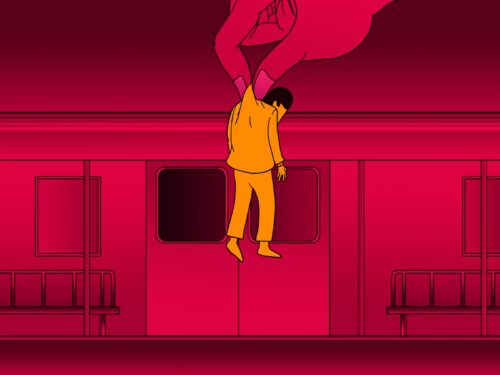‘Reputation collapse’ — Phrase of the Week
Cai Xukun is the latest male pop idol to trash his reputation in China.

Our Phrase of the Week is: Reputation collapse (塌房 tāfáng).
The context
Chinese idol and pop singer Cài Xúkūn 蔡徐坤 is facing reputational ruin following allegations that he forced a young woman to have an abortion in 2021.
According to allegations made on social media last week, Cai had a one-night stand with the woman, referred to as “Ms. C,” in May 2021. Ms. C found out she was pregnant a month later.
Cai’s mother suspected Ms. C was blackmailing her son, so she hired a private investigator to illegally install a pinhole camera near Ms. C’s apartment entrance to monitor her movements.
It is claimed that Cai and his mother used footage gathered from that camera to urge the woman to have an abortion, which she eventually did.
More allegations followed: The pair, with Cai’s mum as a witness, signed a Letter of Understanding (谅解书 liàngjiě shū), the woman was paid off, and the matter was settled.
Since the accusations were made, Cai has remained silent, and the social media storm has grown. On July 3, he finally made a statement on Weibo:
Two years ago, I was single. I had dated Ms. C. The private matters between us were properly resolved in 2021, and there have been no further complications between us.
两年前我处于单身状态,与C女士有过交往,双方之间的私事已经在2021年妥善解决,彼此没有进一步的纠葛。
Liǎng nián qián wǒ chǔyú dānshēn zhuàngtài, yǔ C nǚshì yǒuguò jiāowǎng, shuāngfāng zhījiān de sīshì yǐjīng zài 2021 nián tuǒshàn jiějué, bǐcǐ méiyǒu jìnyíbù de jiūgé.
His statement didn’t stop the ongoing social media storm, with many fans expressing disappointment:
In the past, there was Li Yundi, then there was Wu Yifan, and later there was Li Yifeng. Now, there is also Cai Xukun. They all initially appeared to be gentle and affectionate male idols. Why did they engage in infidelity, casual sexual relations, and force others to have abortions?
前有李云迪,中有吴亦凡,后有李易峰,现在又有蔡徐坤,本来都是那种看起来温情款款的偶像,为什么他们会出轨、会约炮、会逼人堕胎?
Qián yǒu Lǐ Yúndí, zhōng yǒu Wú Yìfán, hòu yǒu Lǐ Yìfēng, xiànzài yòu yǒu Cài Xúkūn. Běnlái dōushì nàzhǒng kànqǐlái wēnqíng kuǎnkuǎn de ǒuxiàng, wèishéme tāmen huì chūguǐ, huì yuēpào, huì bīrén duòtāi?
Reputational ruin is likely to follow, according to one report:
Today’s reputation collapse is inevitable, and it is not deserving of sympathy.
今天的塌房就是必然的事,不值得同情。
Jīntiān de tāfáng jiùshì bìrán de shì, bù zhídé tóngqíng.
And with that, we have our Phrase of the Week.
What it means
Reputation collapse is social media slang. The individual characters in the two-character phrase translate as “collapse” (塌 tā) and “house” (房 fáng). Combined, they translate as “collapsing house.”
In the entertainment world in China, collapsing house is commonly used to describe a celebrity who becomes entangled in a scandal of their own doing, and whose reputation is ruined.
It started becoming a common phrase online in 2019 with a meme involving a woman who saw a collapsed building, went to see what all the fuss was about, and then realized it was her own house:
Seeing a collapsed house over there, I went to see what was happening out of curiosity. But to my surprise, I discovered that it was my own house that had collapsed. At that moment, tears started flowing from my eyes.
看到那边有房子塌了,就过去看热闹,结果发现是自己家的房子塌了,一看我的眼泪就流了下来。
Kàndào nàbiān yǒu fángzi tā le, jiù guòqù kànrènao, jiéguǒ fāxiàn shì zìjǐjiā de fángzi tā le, yíkàn wǒ de yǎnlèi jiù liúle xiàlái.
The metaphor of a collapsing building as a reference to reputational ruin is not new. Another longer phrase from Chinese literature is commonly used in modern Chinese:
They watched as the building rose up, and again when the building collapsed.
眼看他高楼起,眼看他楼塌了。
Yǎnkàn tā gāolóuqǐ, yǎnkàn tā lóutāle.
This would be translated as “fall from grace.”
It’s adapted from a line in The Peach Blossom Fan (桃花扇 táohuā shàn), a musical play and historical drama completed in 1699 by the early Qing dynasty playwright Kǒng Shàngrèn 孔尚任.
The play is Kong’s best-known work. It’s a tragic love story set during the final days of the Ming dynasty, with this line symbolizing the rise and fall of a dynasty. He and other playwrights at the time were fascinated with how and why the Ming fell and what the rulers of the Qing could learn from it.
Unfortunately for Cai Xukun, he didn’t learn from the mistakes of other male celebrities who recently trashed their reputations. So he is now playing a leading role in his very own tragic love story.






